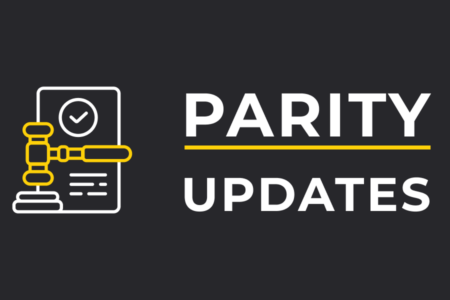A new development has emerged in a suit filed against the Trump White House. The ERISA Industry Committee (ERIC) sued the Departments of Labor, Treasury, and Health and Human Services to stop the final parity rule, which helps ensure access to insurance-covered mental health care. The Trump Administration asked for an extension to respond to the suit, and in response ERIC once again filed a motion in opposition to the Administration. The judge sided with the Administration and granted an extension to May 12 to respond.
In a statement led by The Kennedy Forum and signed by multiple leading health organizations, we applauded President Trump’s Administration for successfully requesting an extension to respond and offered our support during continued actions from ERIC.
The statement reads:
The undersigned organizations dedicated to protecting Americans during a mental health and substance use disorder crisis applaud President Trump’s Administration for successfully requesting an extension to respond to the ERISA Industry Committee’s lawsuit on the Parity Final Rule. We hope the Administration defends the lawsuit vigorously.
The Parity Law is one of the most important tools available to address the mental health and substance use disorder crisis and deliver on this Administration’s goals of reducing wasteful spending, promoting transparency and efficiency, and Making America Healthy Again. The Parity Final Rule continues President Trump’s legacy from his first term, when he signed into law the statute that this rule implements.
The original bipartisan Parity Law, which many of our organizations helped craft, acknowledges the need for practical solutions for both employers and employees. We remain confident that there is a strong path forward in this spirit. We stand ready to support this Administration at every step in preparing a defense of the Parity Final Rule, including providing data, real-world stories, and context for the congressional intent. We can also work with this Administration on actions to further support employers, including offering additional guidance, examples of compliance, and appropriate limitations on liability.
We would like to reiterate our thanks to this Administration. We look forward to partnering in the implementation of the federal Parity Law to ensure that employers and hard-working American families get the care that they paid for and need.
American Foundation for Suicide Prevention
The Kennedy Forum
Legal Action Center
National Council for Mental Wellbeing
American Psychiatric Association
American Psychological Association Services
Mental Health America
National Association for Behavioral Healthcare
REDC Consortium
To learn more background about mental health parity and the suit, click on the questions below:
What is mental health and substance use disorder (MH/SUD) parity?
The parity law requires that certain health insurance plans not limit people’s MH/SUD benefits more than they limit their other health benefits. Basically, MH/SUD coverage has to be fair. Employers that operate health insurance for their employees have to follow this guideline.
How did we get to where we are with parity?
MH/SUD parity was a bipartisan bill signed into law in 2008 by President Bush.
Congress built on this law with another bipartisan bill, which President Trump signed into law in 2020.
Last year, the rule implementing parity was updated to implement this law, with the vast majority of comments signaling support from different constituencies across the country.
Today, parity continues to be popular with the American public – 84% of people think MH/SUD should be treated the same as any other area of health.
Does the parity law work?
Parity implementation did not lead to increased overall costs. The parity law included specific provisions allowing for exemptions on the basis of increased costs. To our knowledge, this exemption was never needed – instead studies find that timely access to MH/SUD care decreases employers’ costs over time.
Parity implementation did lead to better access to care and improved MH/SUD outcomes, across a range of studies. For example, parity led to people with SUD receiving 3 more treatment services a year, making parity an important tool for both combating the opioid crisis and Making America Healthy Again.
How can Congress support employers in implementing the new parity rule?
- Congress can work with the Administration in implementing President Trump’s Executive Order on healthcare price transparency, making it easier for employers to know what they are getting when contracting with health insurers.
- Congress can limit liability for employers when health insurers do not give them the information they need to assess parity in their own plan.
- Congress can work with businesses and constituents to equip the Administration with the information it needs to continue to streamline parity compliance for employers.
What would ERIC’s lawsuit on the parity law do?
ERIC is suing President Trump. If their suit is successful, it would limit the authority of the Administration to decide how they want to implement parity. ERIC complains about a few issues they say would increase employer burden, but Congress can easily address these issues with the actions outlined above to support employers.
To stay apprised on new developments regarding mental health parity and its defense, please stay connected to The Kennedy Forum by signing up for emails.

